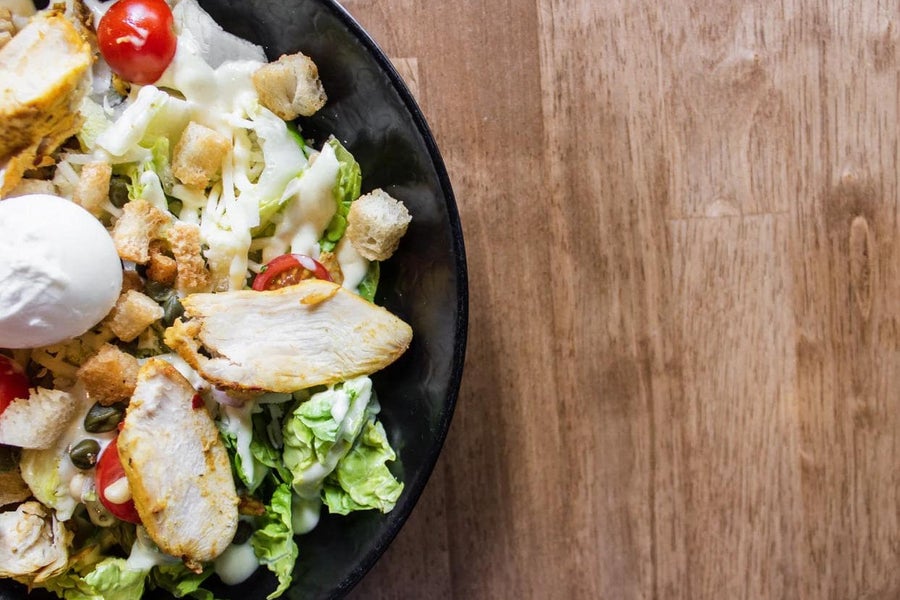Meat, poultry, eggs and fish

The word ‘meat’ covers unprocessed red meat (pork, beef, veal and lamb), processed meat, poultry and fish. There is convincing evidence that links the consumption of red meat and processed meats to an increased risk of colorectal (bowel) cancer. There is evidence to suggest that diets high in red meat (particularly processed meats) can increase the risk of developing cancer. Try to avoid eating too much processed meat. If you eat red meat try to eat small serves of lean meat and limit it to 3-4 times a week. Incorporate chicken and fish into other meals or try vegetarian alternatives.
However, we also know that lean red meat is an important source of iron, zinc, vitamin B12 and protein. In terms of cancer risk there is no reason to cut meat completely from your diet, but there are steps you can take to have a healthier eating pattern.
There is not enough evidence to draw any conclusions on eating poultry and the risk of cancer. However, there is limited evidence that eating fish may help to reduce the risk of colorectal (bowel) cancer.
How much red meat should I eat?
The Australian Dietary Guidelines and Cancer Council recommend that you eat no more than 700 g raw or 455 g cooked, lean red meat each week and that you eat little, if any, processed meat.
This means, you could have a serve of red meat every day or 2 serves across 3–4 meals a week. (one serve is about the size of your palm)
A serve of red meat is equal to 90–100 g raw or 65 g cooked:
- 1⁄2 cup lean raw mince
- 1 lamb loin chop
- 1-2 slices of roast meat
- 1⁄2 cup diced raw meat.
Processed meats are those that have been preserved by smoking, salting, curing or the addition of other preservatives and include bacon, ham and salami. Cancer Council recommends people limit or avoid eating processed meats.
What about poultry, eggs or fish?
Poultry, eggs and fish are also valuable sources of protein. A serve of chicken, eggs or fish is listed below:
- 80g cooked poultry (about 100g raw weight) eg. chicken, turkey
- 2 large eggs (120g)
- 100g cooked fish fillet (about 115g raw weight) or 1 small can fish with no added salt .
What about vegetarians?
Protein rich alternatives to meat, poultry and fish are rich in nutrients and beneficial to all Australians, not just vegetarians. Examples of a serve are listed below:
- 1 cup (150g) cooked dried beans, lentils, chick peas, split peas, or canned beans
- 170g tofu
- 30g nuts or seeds or nut/seed paste, no added salt.
Tips and ideas on meat, poultry and low-fat cooking methods:
- Fill half your dinner plate or more with vegetables/salad; don’t think of meat as the main part of the meal.
- Buy lean cuts of meat – those that have most of the fat trimmed off with minimal marbling (of fat) through the grain of the meat.
- Trim any visible fat off the meat before you cook it.
- Choose chicken pieces without the skin or remove skin before cooking.
Barbecues
Some research suggests that burnt or charred meat, poultry and fish (animal foods) may increase the risk of cancer. Substances called heterocyclic amines are formed when animal foods are cooked at high temperatures and polycyclic aromatic hydrocarbons are formed when they are grilled, or barbequed. These substances may pose a cancer risk. It is recommended not to overcook or blacken animal foods on the barbecue. Marinating them first help prevents these foods from charring. As well as keeping potential cancer- causing agents down, marinating these foods keeps them tender and adds flavour to your meal. You can also use gentler cooking methods such as boiling, casseroling or microwave heating rather than high-temperature grilling, barbecuing or pan-frying.
Learn more about reducing your cancer risk with diet and exercise
